SWEDISH
SOUTH ASIAN STUDIES NETWORK
Newsletter 113:
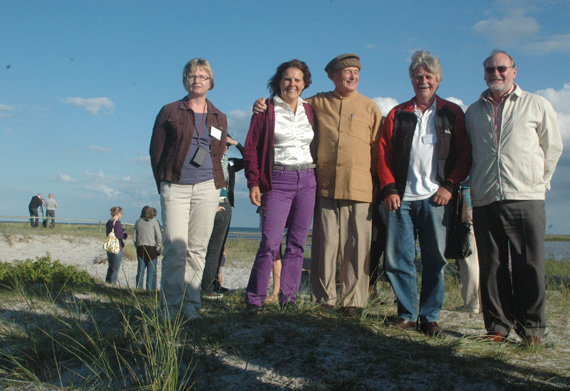 7 September 2010
7 September 2010
| Educational News |
| Lectures and seminars |
| Business and Politics |
| South Asia related Culture |
| New and updated information |
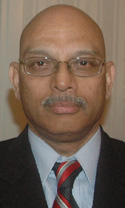 |
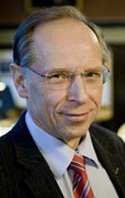 |
| Balkrishna Shetty and Per Eriksson. | |
• SASNET initiative behind ICCR professorship at Lund University
From 1 November 2010, Lund University will host a Visiting Professor from India in the capacity of Senior Professor of Indian Economy and Society, Indian Contemporary History, or Indian Social Science for nine months during each academic year. This is due to an Memorandum of Understanding between the Indian Council for Cultural Relations (ICCR) and Lund University, that was signed on 22 June 2010 by Mr. Balkrishna Shetty, Indian Ambassador to Sweden and Latvia, and Prof. Per Eriksson, Vice-Chancellor, Lund University. In a first phase, the agreement is valid for four years.
As a visiting professor he/she will primarily be engaged in research, but is also expected to take an active role in teaching. In addition, he/she will deliver at least two public addresses during the academic year to be called “The ICCR Lecture on India” .
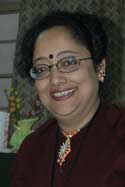 SASNET has been actively involved in finalizing the ICCR professorship at Lund University, with strong support from the Embassy of India in Stockholm.
SASNET has been actively involved in finalizing the ICCR professorship at Lund University, with strong support from the Embassy of India in Stockholm.
In April 2010, SASNET’s director, Dr. Anna Lindberg, participated in an official Lund University delegation to Delhi (more information), where final negotiations were held with representatives of the Ministry of External Affairs, Government of India, and the Indian Council for Cultural Relations, regarding the proposed Indian visiting guest professorship at Lund University.
The first Visiting ICCR Chair Professor at Lund University will be Prof. Lipi Ghosh (photo to the left) from the Department of South and South East Asian Studies at Calcutta University in Kolkata. Prof. Ghosh will take up her position at LU from November 1, 2010, and stay for the rest of the academic year 2010-2011. She will be hosted by the Faculty of Social Sciences and have her workplace at the university’s Centre for Gender Studies.
• 60 visiting ICCR professorships worldwide
 The Indian Council for Cultural Relations is actively working to set up more visiting professorships and chairs in Indian studies in foreign universities. Currently there are about 60 visiting ICCR professorships worldwide, but within a few years the ambition is that there should be 30 more such chairs around the world. In the Nordic countries ICCR professorships exist at Lund University and Copenhagen Business School. See the complete list of ICCR professorships.
The Indian Council for Cultural Relations is actively working to set up more visiting professorships and chairs in Indian studies in foreign universities. Currently there are about 60 visiting ICCR professorships worldwide, but within a few years the ambition is that there should be 30 more such chairs around the world. In the Nordic countries ICCR professorships exist at Lund University and Copenhagen Business School. See the complete list of ICCR professorships.
The council is working to make the chairs “virtual hubs of Indian studies”. Programmes for youth audiences and lecture tours are being linked to institutions that have received ICCR endowments. This is all part of India’s efforts to project the country’s soft power. Currently, ICCR has 24 centres around the world, but it plans to add 15 new centres in the coming year. Related to the university focus has been ICCR’s move to sponsor academic seminars, an introduction of 30 ICCR fellowships to bring foreign scholars to India and 3,500 scholarships for overseas students, 1600 of which go to Afghans. The once iconic “festivals of India”, characteristic of the 1980s, have also been resurrected. In 2010, two long festivals are organised in China and France and half-a-dozen shorter ones in seven other countries. More information in a June 19, 2010 Hindustan Times article.
• Successful SASNET conference for young Nordic scholars
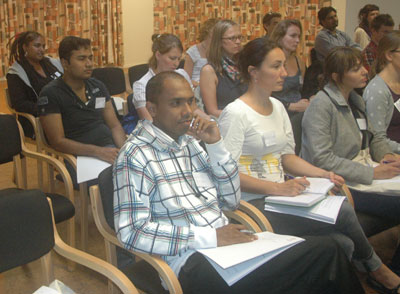 The second SASNET conference on
South Asian Studies for young Nordic scholars was held successfully in Höllviken, south of Malmö, on 18–20 August 2010. 23 masters students, PhD candidates and recent PhDs from Sweden, Denmark, Norway and Finland participated in the three-day conference focusing on three major issues: Interdisciplinary Research; Field Work and Ethics; and Academic Career (Publishing, Teaching, Networking).
The second SASNET conference on
South Asian Studies for young Nordic scholars was held successfully in Höllviken, south of Malmö, on 18–20 August 2010. 23 masters students, PhD candidates and recent PhDs from Sweden, Denmark, Norway and Finland participated in the three-day conference focusing on three major issues: Interdisciplinary Research; Field Work and Ethics; and Academic Career (Publishing, Teaching, Networking).
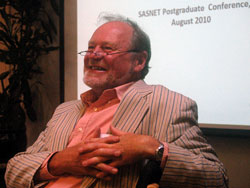 The keynote speaker was Prof. Emeritus Graham Chapman (photo) from the Dept. of Geography, Lancaster University, UK.
Other main speakers were
Dr. Sirpa Tenhunen, Department of Social and Cultural Anthropology, University of Helsinki, Finland; Mr. Teddy Primack, Director of Academic Documents Associates, USA; Associate Professor Jan Vang, Department of Production, Aalborg University, Denmark; Dr. Anna Godhe, Department of Marine Ecology, University of Gothenburg; and Dr. Maria Lantz, Department of Art & Architecture, Royal University College of Fine Arts (KKH), Stockholm.
The keynote speaker was Prof. Emeritus Graham Chapman (photo) from the Dept. of Geography, Lancaster University, UK.
Other main speakers were
Dr. Sirpa Tenhunen, Department of Social and Cultural Anthropology, University of Helsinki, Finland; Mr. Teddy Primack, Director of Academic Documents Associates, USA; Associate Professor Jan Vang, Department of Production, Aalborg University, Denmark; Dr. Anna Godhe, Department of Marine Ecology, University of Gothenburg; and Dr. Maria Lantz, Department of Art & Architecture, Royal University College of Fine Arts (KKH), Stockholm.
The 2010 Höllviken conference
was a follow-up to the successful conference on the same topic that SASNET arranged the year before (more information on the 2009 conference).
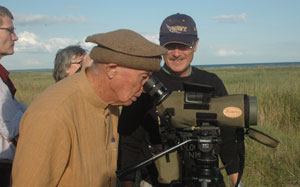 It proved to make a difference from the standard academic conferences and paid attention explicitly to the students. Something that was evaluated very positively from all participants.
The 2010 conference was again held at Falsterbo conference retreat (Falsterbo kursgård) in Höllviken. This time an ornitological excursion led by Dr. Stig Toft Madsen was included in the programme, in order to watch birds and seals at the Falsterbo peninsula. (Photo, Prof. Bo Lindblad watches birds under Stig’s surveillance).
It proved to make a difference from the standard academic conferences and paid attention explicitly to the students. Something that was evaluated very positively from all participants.
The 2010 conference was again held at Falsterbo conference retreat (Falsterbo kursgård) in Höllviken. This time an ornitological excursion led by Dr. Stig Toft Madsen was included in the programme, in order to watch birds and seals at the Falsterbo peninsula. (Photo, Prof. Bo Lindblad watches birds under Stig’s surveillance).
More information on the conference web page.
See the full programme in the conference folder.
See Lars Eklund’s photos from the conference
• Anna Lindberg on research work at Kerala University
During September 2010, SASNET’s Director, Dr. Anna Lindberg, spends one month at the Centre for Gender Studies, Kerala University, India. Anna was selected for a scholarship by the Erasmus Mundus Indo-European mobility program administered by Lund University (more information). At Kerala University, Anna is collecting research material for a forthcoming book on gender issues in South India. She also gives guest lectures at both Kerala University and the Centre for Development Studies (CDS) in Thiruvananthapuram.
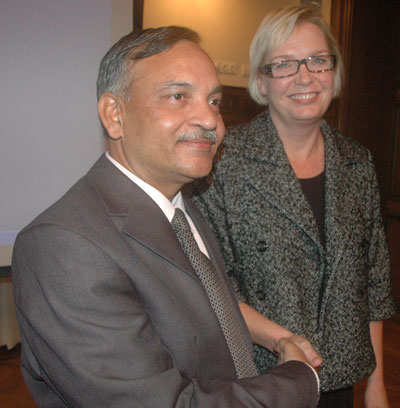 |
| Dr. Atma Ram Shukla welcomed by Ms. Gunilla Carlecrantz, Acting Head of Lund University’s International Relations Department. |
• Indian biogas delegation visited Lund University
On Wednesday 1 September 2010, a delegation of Indian government officials from the Ministry of New and Renewable Energy, researchers and business people working in the field of Biogas production and utilization in India visited Lund University in order to meet Indian students, and representatives of the International Relations department in charge of the university’s ongoing and coming Indo-European and South Asian regional-European Erasmus Mundus mobility programmes. The delegation was headed by Dr. Atma Ram Shukla from the Indian Ministry of New and Renewable Energy, and accompanied by Mr. Mikael Kullman, Counsellor and Special Attaché for Environment, Climate Control and Energy at the Swedish Embassy in New Delhi.
SASNET’s deputy director Lars Eklund also got time to present the Lund University based SASNET network. More information.
• SASNET/Sociology seminar on Indian water management
Dr. A. Rajagopal, R.S.S. Swaminathan Research Foundation in Chennai, India, lectures on ”Water Management and Agrarian change in India” at Lund University on Monday 13 September 2010, 13.15–15.00. The seminar is jointly organised by SASNET and the Research group Society, Development, Environment (Samhälle, utveckling och miljö) at the Department of Sociology. Dr. Rajagopal received his PhD on Water Management in 1991. After that, he worked for many years as a researcher with the South Asia Consortium for Inter Disciplinary Water Resources Studies at Hyderabad, India. Currently he is co-operating with Prof. Göran Djurfeldt and Prof. Emeritus Staffan Lindberg at Lund University in a restudy after 25 years of 213 agricultural households in the Cauvery delta in Tamil Nadu. Dr. Rajagopal’s lecture is based on a paper presented at the 2010 World Water Week at Stockholm (more information). Venue for the seminar:
Dept. of Sociology, Conference room no. 2 (405), Paradisgatan 5, Lund.
• SASNET/Sociology seminar on the food insecurity challenge in India
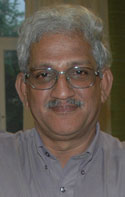 Prof. Venkatesh B. Athreya, R.S.S. Swaminathan Research Foundation in Chennai, India, lectures on ”Food Insecurity Challenge in India” at Lund University on Friday 17 September 2010, 10.15–12.00. The seminar is jointly organised by SASNET and the Research group Society, Development, Environment (Samhälle, utveckling och miljö) at the Department of Sociology.
Prof. Venkatesh B. Athreya, R.S.S. Swaminathan Research Foundation in Chennai, India, lectures on ”Food Insecurity Challenge in India” at Lund University on Friday 17 September 2010, 10.15–12.00. The seminar is jointly organised by SASNET and the Research group Society, Development, Environment (Samhälle, utveckling och miljö) at the Department of Sociology.
Prof. Athreya has been co-operating for many years with Prof. Göran Djurfeldt and Prof. Emeritus Staffan Lindberg at Lund University. Among his most well-known publications are “Literacy and Empowerment” (Sage 1996) and “Barriers Broken” (with Djurfeldt and Lindberg, Sage 1990). Currently he is, just like Dr. Rajagopal mentioned above, co-operating with Djurfeldt and Lindberg at Lund University in a restudy after 25 years of 213 agricultural households in the Cauvery delta in Tamilnadu.
The lecture at Lund University is based on the 2009 World Food programme report ”State of Food Insecurity in Rural India”, to which he contributed (more information). Venue for the seminar:
Dept. of Sociology, Conference room no. 1 (335), Paradisgatan 5, Lund.
See the poster for the lecture.
• SASNET/LUCSUS seminar on Devastating Floods in Pakistan:
A story of Pain, Grief and
Suffering
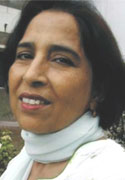 Professor Shahana Urooj Kazmi,
Pro-Vice Chancellor at the University of Karachi, Pakistan will give a presentation entitled ”Devastating Floods in Pakistan:
A story of Pain, Grief and
Suffering – Can We Help?” at Lund University on Wednesday 22 September 2010, at 18.00. Prof. Kazmi, on a short visit to Lund to participate in a consortium meeting of the Erasmus Mundus Asia Regional mobility programme (more information), will give a brief overview regarding the flood relief activities carried out
by teachers and students at her university in the Northern part of Sindh province, through the Karachi University
Disaster Management Volunteer Corps. Students and faculty at Lund University are cordially invited to attend this
seminar also to discuss future relief efforts. The seminar is jointly organised by SASNET and Lund University Centre for Sustainability Studies (LUCSUS).
Venue: Lecture Hall Världen,
Geocentrum 1, Sölvegatan 10, Lund. More information.
Professor Shahana Urooj Kazmi,
Pro-Vice Chancellor at the University of Karachi, Pakistan will give a presentation entitled ”Devastating Floods in Pakistan:
A story of Pain, Grief and
Suffering – Can We Help?” at Lund University on Wednesday 22 September 2010, at 18.00. Prof. Kazmi, on a short visit to Lund to participate in a consortium meeting of the Erasmus Mundus Asia Regional mobility programme (more information), will give a brief overview regarding the flood relief activities carried out
by teachers and students at her university in the Northern part of Sindh province, through the Karachi University
Disaster Management Volunteer Corps. Students and faculty at Lund University are cordially invited to attend this
seminar also to discuss future relief efforts. The seminar is jointly organised by SASNET and Lund University Centre for Sustainability Studies (LUCSUS).
Venue: Lecture Hall Världen,
Geocentrum 1, Sölvegatan 10, Lund. More information.
•
SASNET lecture on Sino-Indian relations
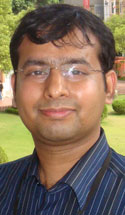 Associate Professor Jagannath Prasad Panda from the Institute for Defense
Studies and Analysis (ISDA) in New Delhi, India,
holds a SASNET lecture on ”The Pattern of Sino-Indian Relations:
Evaluating the Strategic Discourse” at Lund University on
Wednesday 29 September 2010, 10.15–12.00. The seminar is organised in collaboration with the Department of
Political Science, Lund University. Dr. Panda works as a Research Fellow at IDSA, a premier think-tank body in India,
since August 2010. He is also the Managing Editor for the Peace and Development
Digest, published by Foundation for Peace and Sustainable Development in New Delhi.
He defended his doctoral dissertation in 2007 at the School of International Studies,
Jawaharlal Nehru University (JNU), New Delhi.
His research interests focuses on Sino-Indian relations. He has come to Sweden in connection with collaborative research work at the Institute for Security
and Development Policy (ISDP) in Nacka/Stockholm.
He is preparing a paper on ”China, India
and BRIC: Realist Interpretation of a Multi-polar World Order”. Venue for the seminar: Main conference hall (room 366), 2nd floor,
Dept. of Political Science, Paradisgatan 5, Lund. More information.
Associate Professor Jagannath Prasad Panda from the Institute for Defense
Studies and Analysis (ISDA) in New Delhi, India,
holds a SASNET lecture on ”The Pattern of Sino-Indian Relations:
Evaluating the Strategic Discourse” at Lund University on
Wednesday 29 September 2010, 10.15–12.00. The seminar is organised in collaboration with the Department of
Political Science, Lund University. Dr. Panda works as a Research Fellow at IDSA, a premier think-tank body in India,
since August 2010. He is also the Managing Editor for the Peace and Development
Digest, published by Foundation for Peace and Sustainable Development in New Delhi.
He defended his doctoral dissertation in 2007 at the School of International Studies,
Jawaharlal Nehru University (JNU), New Delhi.
His research interests focuses on Sino-Indian relations. He has come to Sweden in connection with collaborative research work at the Institute for Security
and Development Policy (ISDP) in Nacka/Stockholm.
He is preparing a paper on ”China, India
and BRIC: Realist Interpretation of a Multi-polar World Order”. Venue for the seminar: Main conference hall (room 366), 2nd floor,
Dept. of Political Science, Paradisgatan 5, Lund. More information.
• SASNET/UPF/Swallows seminar on the Impact of Microcredits in South Asia
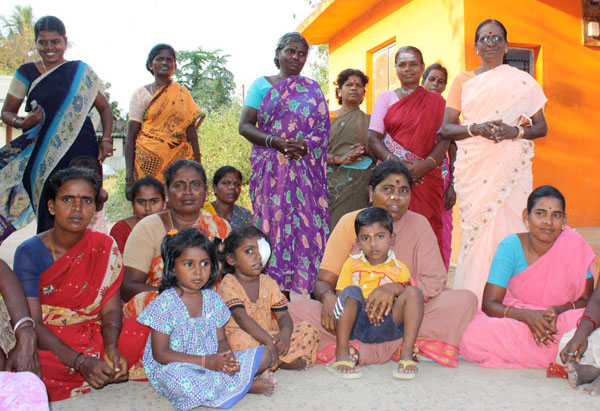 A SASNET seminar on ”Emancipation or Dependency: Microcredits in South Asia” will be held in Lund on Wednesday 20 October 2010, 19.00–21.00. The seminar will be co-organised by The Association of Foreign Affairs at Lund University (UPF), and The Swallows India Bangladesh section, an NGO based at Lund. The seminar features Markus Pauli, Doctoral Candidate, University of Heidelberg, Germany who will talk about ”Microfinance in India – assessing its impact with the capability approach”; and Ms. Khushi Kabir, Coordinator for Nijera Kori, a non governmental development organization in Bangladesh.
A SASNET seminar on ”Emancipation or Dependency: Microcredits in South Asia” will be held in Lund on Wednesday 20 October 2010, 19.00–21.00. The seminar will be co-organised by The Association of Foreign Affairs at Lund University (UPF), and The Swallows India Bangladesh section, an NGO based at Lund. The seminar features Markus Pauli, Doctoral Candidate, University of Heidelberg, Germany who will talk about ”Microfinance in India – assessing its impact with the capability approach”; and Ms. Khushi Kabir, Coordinator for Nijera Kori, a non governmental development organization in Bangladesh.
The following discussion will be will be moderated by Dr. Anna Lindberg, SASNET. Venue for the seminar: Café Athen, Sandgatan 2, Lund.
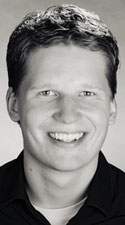 – Markus Pauli (photo to the left) is currently working on his doctoral thesis (with the provisional title ”The Power of Individual Freedom as a Concept and Practice in Development –
Operationalization of the Capability Approach for Assessing the Impact of
Poverty-Oriented Microfinance in India”) within Heidelberg University’s Cluster of Excellence 'Asia and Europe in a Global Context' Graduate Programme for Transcultural Studies. In his research based on fieldwork conducted in Tamil Nadu, Mr. Pauli studies the impact of microfinance in India, trying to operationalize the capability approach of Amartya Sen in order to draw a more comprehensive picture of the positive and negative impact of microfinance.
– Markus Pauli (photo to the left) is currently working on his doctoral thesis (with the provisional title ”The Power of Individual Freedom as a Concept and Practice in Development –
Operationalization of the Capability Approach for Assessing the Impact of
Poverty-Oriented Microfinance in India”) within Heidelberg University’s Cluster of Excellence 'Asia and Europe in a Global Context' Graduate Programme for Transcultural Studies. In his research based on fieldwork conducted in Tamil Nadu, Mr. Pauli studies the impact of microfinance in India, trying to operationalize the capability approach of Amartya Sen in order to draw a more comprehensive picture of the positive and negative impact of microfinance.
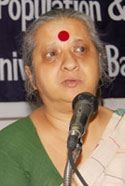 – Kushi Kabir (photo to the right) is Executive Director for Nijera Kori, Bangladesh, an organisation working in 1,375 villages in 17 districts of Bangladesh. Nijera Kori believes in creating strong autonomous organizations of the rural poor, able to assert their rights and ensure their entitlements as citizens of Bangladesh, facilitating better access to rural services and available resources, with a view to building self-reliance through mobilisation and collective action rejecting use of micro credit as well as other service delivery approaches. Ms. Kabir is also the Chairperson for the Association of Land Reform and Development (ALRD), a network of NGOs and Bangladeshi citizens active in land rights issues.
– Kushi Kabir (photo to the right) is Executive Director for Nijera Kori, Bangladesh, an organisation working in 1,375 villages in 17 districts of Bangladesh. Nijera Kori believes in creating strong autonomous organizations of the rural poor, able to assert their rights and ensure their entitlements as citizens of Bangladesh, facilitating better access to rural services and available resources, with a view to building self-reliance through mobilisation and collective action rejecting use of micro credit as well as other service delivery approaches. Ms. Kabir is also the Chairperson for the Association of Land Reform and Development (ALRD), a network of NGOs and Bangladeshi citizens active in land rights issues.
More information on the seminar.
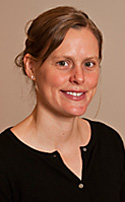 |
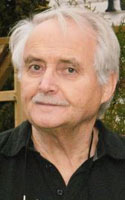 |
| Camilla Orjuela and Peter Schalk. | |
• SASNET/UPF seminar on the Sri Lanka post-war situation
A SASNET/UPF seminar on ”Sri Lanka after the War will be held in Lund on Wednesday 24 November 2010, 19.00–21.00. The speakers are Dr. Camilla Orjuela, Peace and Development Studies, School of Global Studies, University of Gothenburg, who will talk about ”Sri Lanka after the War: Sustainable Peace or new Conflicts?”; and Professor Peter Schalk, Chair in the History of Religions (in particular in Hinduism and Buddhism) at the Faculty of Theology, Uppsala university, who will talk about ”Defeated but Defiant. The Ilamtamil Resistance Movement after May 2009”. The seminar is co-organised by SASNET and the Association of Foreign Affairs (UPF) at Lund University. Venue for the seminar: Café Athen, Sandgatan 2, Lund.
• More information about SASNET and its
activities
See SASNET’s page, http://www.sasnet.lu.se/sasnet.html
Swedish universities introduce tuition fees and scholarships next year
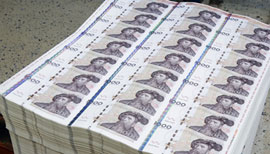 From the 2011/2012 academic year Swedish universities will charge tuition and application fees for students coming from countries outside the European Union (and also excepting students from Iceland, Norway and Switzerland).
Exchange students will however continue to be exempt from fees, as their studies are regulated by agreements between Swedish and foreign universities. Thus, the new rules apply only to free movers from outside the EU/EEA studying at the bachelor’s or master’s level. PhD programmes will also continue to be tuition-free.
From the 2011/2012 academic year Swedish universities will charge tuition and application fees for students coming from countries outside the European Union (and also excepting students from Iceland, Norway and Switzerland).
Exchange students will however continue to be exempt from fees, as their studies are regulated by agreements between Swedish and foreign universities. Thus, the new rules apply only to free movers from outside the EU/EEA studying at the bachelor’s or master’s level. PhD programmes will also continue to be tuition-free.
Up until now, Sweden has been one of the few countries in Europe that has not charged any types of fees. All students – regardless of nationality – have been funded by Swedish taxpayers. In the last decade, the number of foreign students has more than tripled, totaling 36,000 in 2008/2009. The government now wants to reallocate some of this money to award higher education institutions that show particular excellence.
The fees will be supplemented by a couple of scholarship programmes, available to bachelors and masters students. One of the programmes will be endowed with SEK 30 million per year and is aimed at students from countries with which Sweden already has long-term development cooperations, mainly in Africa. From Asia only students from Bangladesh and Cambodia are eligible to apply.
Another scholarship program will be administered by universities directly and is open to all students from outside the EU/EEA. The budget will be SEK 30 million (€ 3 million) for 2011, and will be increased to SEK 60 million for 2012.
More information on the new Swedish tuition fee system.
Every Swedish university decides independently on the size of the new tuition fees for non-European students. On 28 June 2010, Lund University decided about its fee structure. The fees vary from SEK 100,000 per year for bachelors studies in Humanities, to SEK 230,000 for studies in Medicine, and SEK 400,000 for Theatre Studies. More information (only in Swedish)
• Doctoral dissertation on the HIV/AIDS Epidemic among young urban Pakistanis
 Syed
Farid-ul-Hasnain in the Research Group on Epidemiology and Health systems research focusing on equity and gender at the Division of Global health
(IHCAR), Karolinska Institutet Medical University, Stockholm, will defend his doctoral dissertation entitled ”Young Adults in Urban Pakistan; Barriers and Challenges for Improving Health Behaviors in the wake of the HIV/AIDS Epidemic” on Thursday 16 September 2010, at 13.00.
The thesis is grounded in the fact that HIV/AIDS is spreading globally more specifically among the younger generation. The impact of HIV/AIDS on the youth cannot be underestimated. The studies were conducted in the city of Karachi, Pakistan, which is the largest city and the economic and commercial hub of Pakistan and comprises of people from all ethnic backgrounds.
Syed
Farid-ul-Hasnain in the Research Group on Epidemiology and Health systems research focusing on equity and gender at the Division of Global health
(IHCAR), Karolinska Institutet Medical University, Stockholm, will defend his doctoral dissertation entitled ”Young Adults in Urban Pakistan; Barriers and Challenges for Improving Health Behaviors in the wake of the HIV/AIDS Epidemic” on Thursday 16 September 2010, at 13.00.
The thesis is grounded in the fact that HIV/AIDS is spreading globally more specifically among the younger generation. The impact of HIV/AIDS on the youth cannot be underestimated. The studies were conducted in the city of Karachi, Pakistan, which is the largest city and the economic and commercial hub of Pakistan and comprises of people from all ethnic backgrounds.
The study reveals that females were twice as likely to dropout of school/college as males. The risk factors for school/college dropout for both males and
females were migrant residential status, living in an extended family and low socio- economic status. Furthermore, females exhibited a higher level of awareness about STDs and HIV/AIDS than the males, irrespective of whether they had dropped out of school or not. Venue:
Rockefeller Hall, Nobels Väg 11, Solna Campus, Karolinska Institutet, Stockholm.
Read an abstract with a link to the full-text thesis.
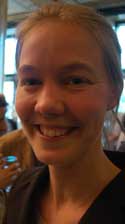 • Doctoral dissertation on Swedish missionary narratives from South India
• Doctoral dissertation on Swedish missionary narratives from South India
Malin Gregersen, Department of History, Lund University will defend her doctoral dissertation entitled ”Fostering Obligations. Representations of a Mission in South India in the First Half of the 20th Century” on Friday 8 October 2010, 10.15. The thesis focuses on narratives from Swedish missionaries working in the small town of Tirupattur, Tamil Nadu, and their influence in the formation of early 20th century Swedish world views. Malin Gregersen problematizes the issue by pointing out that these narratives of everyday life in foreign countries were formulated out of a mission, not only to convert to christianity but to foster and mould people according to their different ideals. The faculty opponnent will be Prof. Kajsa Ahlstrand, World Christianity and Interreligious Studies, Faculty of Theology, Uppsala University. Venue: Dept. of History, hall 3, Magle Stora Kyrkogata 12 A, Lund. Full information, including link to full-text tesis.
• Sida announces grants for partner driven collaborative research projects
 The Programme for Partner Driven Cooperation (Aktörssamverkan) at the Swedish International Development Cooperation Agency, Sida, announces a call for applications for support to collaborative projects related to access to and use of research for 2010 – 2012. This programme is not support to research but rather assisting partners in assessing and using research in policy formulation and innovation.
Research and use of research results is fundamental for economic development and successful application of research often results when several actors are involved. Sida’s initiative for Partner Driven Cooperation is aiming to support sustainable cooperation relationships.
The Programme for Partner Driven Cooperation (Aktörssamverkan) at the Swedish International Development Cooperation Agency, Sida, announces a call for applications for support to collaborative projects related to access to and use of research for 2010 – 2012. This programme is not support to research but rather assisting partners in assessing and using research in policy formulation and innovation.
Research and use of research results is fundamental for economic development and successful application of research often results when several actors are involved. Sida’s initiative for Partner Driven Cooperation is aiming to support sustainable cooperation relationships.
This initiative concerns only countries in “Category 5 – Selective Cooperation Countries” – China, India, Indonesia, Vietnam, South Africa, Botswana and Namibia.
Grants are for maximum three years (2010-2012) and for a maximum of 1.5 MSEK per year. Sida is reserving 30 million Swedish crowns (SEK) per year 2010-2012 for this call. Applications are to be sent in electronically by latest 1 October 2010. More information.
• Hyderabad project on waste water treatment example of successful implementation
Through the Partner Driven Cooperation programme, Sida supports projects based on the partners own initiatives and mutual interest in cooperating. Partners may be authorities, municipalities, non-governmental organisations, institutes, trade unions or private companies. The goal is to establish long-term, self-sustaining relations, and to create a ”win-win-win” situation for the people in poverty, for those participating in projects in partner countries, and for those involved in Sweden.
 As an example of a successful implementation of a partnership cooperation programme with India, could be mentioned a project between the Swedish Environmental Research Institute (IVL) in Stockholm and Gothenburg, and the Jawaharlal Nehru Technological University (JNTU) in Hyderabad. This project, funded by Sida since 2009, focuses on the fact that industrial companies in Hyderabad need knowledge and technology to purify waste water. The collaboration with IVL makes it possible for them to enhance their expertise and consider holistic solutions for polluted water. Several other partners in India are participating in the collaboration, including CII, the Indian equivalent of the Confederation of Swedish Enterprise; the environmental institute EPTRI; and Gamana, a voluntary organisation promoting environmental debate in society.
As an example of a successful implementation of a partnership cooperation programme with India, could be mentioned a project between the Swedish Environmental Research Institute (IVL) in Stockholm and Gothenburg, and the Jawaharlal Nehru Technological University (JNTU) in Hyderabad. This project, funded by Sida since 2009, focuses on the fact that industrial companies in Hyderabad need knowledge and technology to purify waste water. The collaboration with IVL makes it possible for them to enhance their expertise and consider holistic solutions for polluted water. Several other partners in India are participating in the collaboration, including CII, the Indian equivalent of the Confederation of Swedish Enterprise; the environmental institute EPTRI; and Gamana, a voluntary organisation promoting environmental debate in society.
More information about IVL and the Hyderabad project.
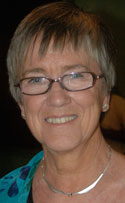 |
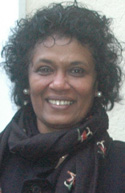 |
| Gunilla Lindmark and Kumudu Wijewardena. | |
• Swedish-Srilankan collaboration project on
Health and Social Care completed
During the period 2003–2009, the Department of Women’s
and Children’s
Health/
International Maternal and Child Health (IMCH), Uppsala University was involved in a major Sida-funded multidisciplinary research collaboration programme on “Health
and Social Care for the Socially Marginalized People” with the Faculty of Medical Sciences at the University of Jayewardenapura in Sri Lanka. The programme was coordinated by Prof. Gunilla Lindmark at IMCH, and Prof. Kumudu
Wijewardena,
Dean for the Faculty of Graduate Studies, Sri Jayewardenapura University, Colombo, Sri Lanka.
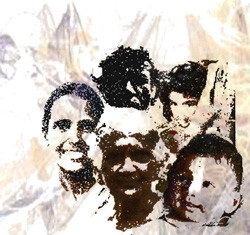 Emphasis was given for gender
equity, violence against women and children, social issues related to
Middle East migrant female workers, and issues of war widows and orphans.
The overall purpose was to strengthen the capacity of university teachers in health and social
science research, and to carry out research in relation to social and health issues of socially
marginalized people that will help the government of Sri
Lanka to formulate policy and interventions that may reduce morbidity
and mortality and improve quality of life. Support from Swedish experts in several
disciplines was provided to Sri Lankan students to conduct multidisciplinary
research.
Emphasis was given for gender
equity, violence against women and children, social issues related to
Middle East migrant female workers, and issues of war widows and orphans.
The overall purpose was to strengthen the capacity of university teachers in health and social
science research, and to carry out research in relation to social and health issues of socially
marginalized people that will help the government of Sri
Lanka to formulate policy and interventions that may reduce morbidity
and mortality and improve quality of life. Support from Swedish experts in several
disciplines was provided to Sri Lankan students to conduct multidisciplinary
research.
Swedish researchers and graduate students have also worked in close collaboration
with Srilankan researchers, and this has resulted in a number of PhD and Masters thesis projects being carried out under
the project. SASNET has been partly involved, by co-organising the february 2009 workshop on ”Women and Migration in South Asia
– Health and Social Consequences” that was held in Colombo (more information).
The final project report for the Sri Lanka collaboration programme was delivered in August 2010. Read the full report (as a pdf-file)
IMCH is also involved in other major
international South Asia related research programmes funded by the Swedish International Development Cooperation Agency (Sida). In India IMCH has worked on projects focusing on Sexual and Reproductive
Health & Rights, especially in Rajasthan. More information about IMCH’s Indian collaboration programmes.
• Indo-Swedish project on Sustainable Health completed at Pravara
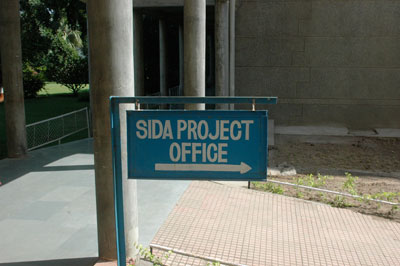 During the period 2005–2009, Pravara Institue of Medical Sciences Deemed University in Loni, Maharashtra, India, was involved in a major Sida-funded research programme on ”Developing a multi-sectoral approach model to sustainable health and development through institutional collaboration between India and Sweden”, with the Department of Medical and Health Sciences (IMH), Faculty of Health Sciences, Linköping University; and the School of Life Sciences,
Skövde University. This successful research programme was completed in March 2010. More information about the programme.
During the period 2005–2009, Pravara Institue of Medical Sciences Deemed University in Loni, Maharashtra, India, was involved in a major Sida-funded research programme on ”Developing a multi-sectoral approach model to sustainable health and development through institutional collaboration between India and Sweden”, with the Department of Medical and Health Sciences (IMH), Faculty of Health Sciences, Linköping University; and the School of Life Sciences,
Skövde University. This successful research programme was completed in March 2010. More information about the programme.
Since 2008, Pravara Institute of Medical Sciences is also involved in the Indo-European Erasmus Mundus mobility programme coordinated by Lund University, and with a second Swedish partner university in Karolinska Institutet Medical University in Stockholm. More information.
However, Pravara is interested to have more collaboration between its Centre for Social Medicine, and Swedish universities. Urban Poverty and Health has been one of the focus areas of Pravara for interventional research, and the university now invites proposals from like minded academic institutes and universities in Sweden, especially in the field of sexual and reproductive health. Pravara also offers International Masters courses in Rural Health, PG Diploma in Epidemiology and Health Management, Certificate courses in Social Health and Development. More information.
• Ishtiaq Ahmed writes on the Pakistan floods disaster
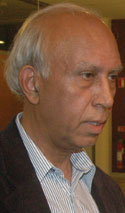 Professor Emeritus Ishtiaq Ahmed, Dept. of Political Science, Stockholm University writes In Focus September 2010 article entitled ”In the aftermath of the Pakistan floods disaster”, at the AsiaPortal Blog named Barha (hosted by the Nordic Institute of Asian Studies in Copenhagen). It deals with the consequences of the recent floods on the complex political and economic situation of Pakistan and the changes needed to bring stability to the country.
The floods caused by heavy monsoon rains in north west Pakistan led to rivers breaking their banks, and now affect some 20 million people. It is estimated that 1,600 people have been killed and 6 million people are in desperate need of aid in the form of food, drinking water and shelter. Whole villages have been swept away by the floods which cover an area the size of Italy.
Professor Emeritus Ishtiaq Ahmed, Dept. of Political Science, Stockholm University writes In Focus September 2010 article entitled ”In the aftermath of the Pakistan floods disaster”, at the AsiaPortal Blog named Barha (hosted by the Nordic Institute of Asian Studies in Copenhagen). It deals with the consequences of the recent floods on the complex political and economic situation of Pakistan and the changes needed to bring stability to the country.
The floods caused by heavy monsoon rains in north west Pakistan led to rivers breaking their banks, and now affect some 20 million people. It is estimated that 1,600 people have been killed and 6 million people are in desperate need of aid in the form of food, drinking water and shelter. Whole villages have been swept away by the floods which cover an area the size of Italy.
Go for Prof. Ahmed’s article at the In Focus blog.
• Research position available at Social Science Baha in Kathmandu
 Social Science Baha in Kathmandu, Nepal, announces a position of Research Associate in the project ‘Biomedical and Health Experimentation in South Asia: Critical Perspectives on collaboration, governance and competition’, which is part of a research grant awarded by the British Economic and Social Research Council/DfID to the University of Edinburgh. S/he will conduct ethnographic research, supplemented with focussed interviews, into the running of clinical and public health trials in Nepal (mainly in Kathmandu). More information about the project.
Social Science Baha in Kathmandu, Nepal, announces a position of Research Associate in the project ‘Biomedical and Health Experimentation in South Asia: Critical Perspectives on collaboration, governance and competition’, which is part of a research grant awarded by the British Economic and Social Research Council/DfID to the University of Edinburgh. S/he will conduct ethnographic research, supplemented with focussed interviews, into the running of clinical and public health trials in Nepal (mainly in Kathmandu). More information about the project.
The main aims of this research are to understand the relationships that link experimental scientific enquiry in the field of medicine and public health, the pharmaceutical industry, and developmental programmes, and to assess the developmental impact of these activities in South Asia. Members of the research group belong to the Centre for South Asian Studies at the University of Edinburgh (including Prof. Roger Jeffery and Dr Ian Harper), and the Department of Anthropology, University of Durham. Social Science Baha is the institutional partner in Nepal. The research team also includes Dr Jeevan Sharma (Tufts University), who has been working in a research programme entitled ‘Aid, Conflict and Social Transformation in Nepal’ since 2007. The research team in Durham include Prof Robert Simpson and Dr Salla Sariola. The successful applicant will be based at the Social Science Baha, Battisputali, Kathmandu. The post will commence as soon as possible after 1 September 2010, and will last no later than 31 August 2012.
Applicants should have a master’s degree in a social science discipline and be experienced in research and writing. S/he should also have some awareness of research activities in Nepal, including clinical trials, randomised control trials and other public health research in Nepal. Application deadline: 8 September 2010. More information.
• Specialist in the Literary Cultures of North India wanted in Pennsylvania
The Department of South Asia Studies at the University of Pennsylvania seeks to appoint a standing faculty member who is a specialist in the literary cultures of north India, 1600 to the present, with special focus on Hindi and/or Urdu. Rank is open. Candidates must have expert knowledge of the relevant language and its literature (including Hindi and/or Urdu), its literary milieux, its relationship to other languages, and its historical development. The successful applicant will display demonstrable excellence in undergraduate teaching, as well as the ability to supervise graduate student work in relevant languages (including Hindi and/or Urdu) in a wide array of disciplinary contexts. Applications will be reviewed starting October 1, 2010 and will continue until the position is filled. More information.
• IISH in Amsterdam announces research positions
 The International Institute for Social History (IISH) of the Royal Netherlands Academy of Arts and Sciences in Amsterdam, Netherlands, invites applications for Research
Fellowships with specific reference to South, Southeast and Central Asia. The fellowships are scheduled for the periods 1
February – 30 June 2011 and 1 September 2011 – 31 January 2012. Minimum requirement is a PhD degree or equivalent academic track record.
The fellows research plan should also fit the Institutes focus on social
history. A close link with the Institutes research programme on Global
Labour History is strongly recommended. Applications should be submitted no later than 1 October 2010. More information.
The International Institute for Social History (IISH) of the Royal Netherlands Academy of Arts and Sciences in Amsterdam, Netherlands, invites applications for Research
Fellowships with specific reference to South, Southeast and Central Asia. The fellowships are scheduled for the periods 1
February – 30 June 2011 and 1 September 2011 – 31 January 2012. Minimum requirement is a PhD degree or equivalent academic track record.
The fellows research plan should also fit the Institutes focus on social
history. A close link with the Institutes research programme on Global
Labour History is strongly recommended. Applications should be submitted no later than 1 October 2010. More information.
• More information about South Asia related
research at Swedish and Nordic universities
See SASNET’s page, http://www.sasnet.lu.se/research.html
• New Masters Programme in Asian Studies at Stockholm University
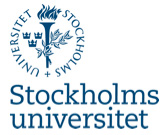 The Department of Oriental Languages introduces a new two-year 120 ECTS credits Masters Programme in Asian Studies from the Fall semester 2010. The programme has two branches, one focusing on East Asia, and another focusing on Central and South Asia. Students who wish to join the programme are required to have a BA including at least 60 ECTS credits from Asian language studies (for students to the South Asia branch this means Hindi, Urdu or Bengali), and to have written an Asia related BA thesis.
The Department of Oriental Languages introduces a new two-year 120 ECTS credits Masters Programme in Asian Studies from the Fall semester 2010. The programme has two branches, one focusing on East Asia, and another focusing on Central and South Asia. Students who wish to join the programme are required to have a BA including at least 60 ECTS credits from Asian language studies (for students to the South Asia branch this means Hindi, Urdu or Bengali), and to have written an Asia related BA thesis.
Full information on the Masters programme (in Swedish only).
The Division of South and Central Asian Studies (Section for Indology) within the Department of
Oriental Languages runs educational courses on
the ancient as well as modern languages and cultures of
South Asia, with special emphasis on India, up to the level
of Bachelors and Masters degrees. The Indology
courses are separated into one track specialized
on Ancient and Medieval India – with Sanskrit studies, and another
track specialized on Modern India –
with Hindi studies. More
information on all courses run during the Fall 2010.
• Alumni Masters students from Lund University proceed with doctoral studies
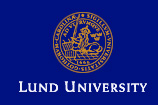 The eigth batch of students now join the 120 ECTS Master Programme in Asian Studies at Lund University. The programme has been
successfully run at Lund University since 2003. It is an interdisciplinary programme,
focusing on political, economic, social, and cultural issues in
Asia. It is the only English language programme of its kind in
the Nordic countries. The programme is aimed at students who after
their undergraduate studies want to gain area expertise on contemporary
Asian societies. It is administered by the Centre
for East and South-East Asian Studies (ACE) at
Lund University. In India, the programme collaborates with several institutes, among them the Institute of Social Sciences in New Delhi, and Tata Institute of Social Sciences in Mumbai.
The eigth batch of students now join the 120 ECTS Master Programme in Asian Studies at Lund University. The programme has been
successfully run at Lund University since 2003. It is an interdisciplinary programme,
focusing on political, economic, social, and cultural issues in
Asia. It is the only English language programme of its kind in
the Nordic countries. The programme is aimed at students who after
their undergraduate studies want to gain area expertise on contemporary
Asian societies. It is administered by the Centre
for East and South-East Asian Studies (ACE) at
Lund University. In India, the programme collaborates with several institutes, among them the Institute of Social Sciences in New Delhi, and Tata Institute of Social Sciences in Mumbai.
Several of the former students from the Masters programme at Lund University have proceeded to interesting careers and doctoral studies at universities all over Europe. More information on these alumni students.
• More information about South Asia related
education at Swedish and Nordic universities
See SASNET’s page, http://www.sasnet.lu.se/education.html
• Full-day workshop with Sunita Narain at World Water week in Stockholm
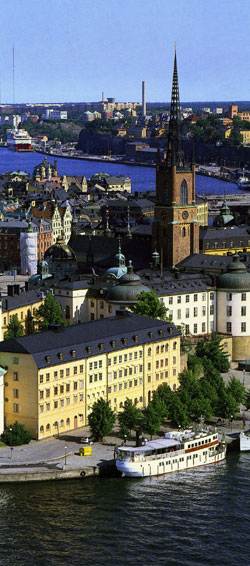 The 2010 World Water Week in Stockholm is held 5–11 September 2010. The theme for 2010 is ”Responding to Global Changes: The Water Quality Challenge – Prevention, Wise Use and Abatement”. The World Water Week, organised for the 20th time by the Stockholm International Water Institute (SIWI) is
the leading annual global meeting place for capacity-building,
partnership-building and follow-up on the implementation of international
processes and programmes in water and development, with large relevance
to South Asia. It is filled with plenary sessions, seminars, workshops,
side events and special activities. The Scientific Programme Committee (SPC) planning for the conference is chaired by Prof. Jan Lundqvist at SIWI.
The 2010 World Water Week in Stockholm is held 5–11 September 2010. The theme for 2010 is ”Responding to Global Changes: The Water Quality Challenge – Prevention, Wise Use and Abatement”. The World Water Week, organised for the 20th time by the Stockholm International Water Institute (SIWI) is
the leading annual global meeting place for capacity-building,
partnership-building and follow-up on the implementation of international
processes and programmes in water and development, with large relevance
to South Asia. It is filled with plenary sessions, seminars, workshops,
side events and special activities. The Scientific Programme Committee (SPC) planning for the conference is chaired by Prof. Jan Lundqvist at SIWI.
Many of the workshops and seminars have special relevance for South Asia. Dr. Sunita Narain, Centre for Science and Environment, India, is a keynote speaker in Workshop No 8 on ”Origins, Pathways and Accumulation of Pollutants – An Urban Perspective”, a full-day workshop held on Wednesday 8 September. The workshop is convened by SIWI in collaboration with Water Environment Federation (WEF) and United Nations Educational, Scientific and Cultural Organization – International Hydrological Programme (UNESCO-IHP).
On Thursday 9 September, the International Centre for Integrated Mountain Development (ICIMOD) and International Institute for Environment and Development (IIED) organises a side event in the evening, entitled ”Living with too much and too little Water in the Himalayan Region” (more information).
Venue: Stockholm
International Fairs and Congress Center (Stockholmsmässan) in Älvsjö, 9 km south of central Stockholm. More information about the 2010 World Water Week.
• South Asia Writing Workshop at University of Copenhagen
 • The Centre of Global South Asian Studies, and the Asian Dynamics Initiative at the University of Copenhagen organize the Copenhagen South Asia Workshop (CSAW) 2010, to be held on Tuesday 28 September 2010, 09.30-17.30. The theme for the workshop will be ”Writing South Asia”. Researchers engaged in the studies of South Asia are invited to reflect upon the ways in which societies write and are written about through history. The workshop aims at a collective exploration of different modes of expression, practices of record keeping, technologies of archive, and ethnographic incursions.
• The Centre of Global South Asian Studies, and the Asian Dynamics Initiative at the University of Copenhagen organize the Copenhagen South Asia Workshop (CSAW) 2010, to be held on Tuesday 28 September 2010, 09.30-17.30. The theme for the workshop will be ”Writing South Asia”. Researchers engaged in the studies of South Asia are invited to reflect upon the ways in which societies write and are written about through history. The workshop aims at a collective exploration of different modes of expression, practices of record keeping, technologies of archive, and ethnographic incursions.
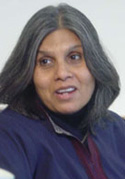 These include a wide range of writings produced by the pre-colonial, colonial and postcolonial state authorities from census databases, district reports, handbooks and manuals, history textbooks to writing by individuals such as travel writing, works of fiction, biographies, memoirs and autobiographies. The idea is to reflect upon how words form, inform and even deform different subjectivities and identities.
These include a wide range of writings produced by the pre-colonial, colonial and postcolonial state authorities from census databases, district reports, handbooks and manuals, history textbooks to writing by individuals such as travel writing, works of fiction, biographies, memoirs and autobiographies. The idea is to reflect upon how words form, inform and even deform different subjectivities and identities.
Deadline for paper submissions is 7 September 2010.
Tanika Sarkar, Professor of Modern history, Jawaharlal Nehru University (JNU), Delhi, India will deliver the key note address entitled ”Words to Win: A Modern Autobiography” that draws our attention to how autobiographical writing became a particular mode of expression among women during the colonial times. Tanika Sarkar is currently a Visiting Fellow Commoner at Trinity College Cambridge.
The paper presenters include Esther Fihl, who has written on ”Encountering native voices in Tranquebar in South India”; Jyoti Atwal on ”A Hindu Widow's Narrative of the Body”; Stine Simonsen Puri on ”‘The temple whores' of Tranquebar”; Dan V Hirslund on ”Waiting & cadreship among Maobadi youth in Nepal”; Frida Hastrup on ”Enacting Protection. Environmental Concerns in Coastal Tamil Nadu”; Peter B. Andersen on ”The Santal Rebellion 1855”; Ida Sofie Matzen on ”The creation of a secular Muslim state and the invention of Sufism”; and SASNET’s director Anna Lindberg on ”The Marrying of Children in Travancore in the 1940s: Gender discourses and childhood”. Venue for the workshop: Nordic Institute of Asian Studies (NIAS), Leifsgade 33, 3rd floor, Copenhagen
.More information about CSAW 2010.
• Heidelberg conference on The Flow of Concepts and Institutions
 The Research Cluster of Excellence 'Asia and Europe in a Global Context' at Heidelberg University, Germany, organises its 2010 Annual Conference on 6–8 October 2010. The theme for the 2010 conference, to which scholars from all over the world has been invited, will be ”The Flow of Concepts and Institutions”. Podium discussions will examine the global flows between Asia and Europe focusing on governance and religiosity, and a range of panels bring together senior and young scholars from outside and within the Cluster. The keynote presentation will be given by Quentin Skinner, Barber Beaumont Professor of the Humanities at Queen Mary, University of London, who will talk about ”European visions of liberty: a genealogy”. During the conference, Mette Halskov Hansen, Ute Huesken and Mark Teeuwe from the University of Oslo will also be given time to present their new research initiative on ”Asian Cultures of Learning”. More information about the conference.
The Research Cluster of Excellence 'Asia and Europe in a Global Context' at Heidelberg University, Germany, organises its 2010 Annual Conference on 6–8 October 2010. The theme for the 2010 conference, to which scholars from all over the world has been invited, will be ”The Flow of Concepts and Institutions”. Podium discussions will examine the global flows between Asia and Europe focusing on governance and religiosity, and a range of panels bring together senior and young scholars from outside and within the Cluster. The keynote presentation will be given by Quentin Skinner, Barber Beaumont Professor of the Humanities at Queen Mary, University of London, who will talk about ”European visions of liberty: a genealogy”. During the conference, Mette Halskov Hansen, Ute Huesken and Mark Teeuwe from the University of Oslo will also be given time to present their new research initiative on ”Asian Cultures of Learning”. More information about the conference.
• Gorakhpur conference on Environment Technology and
Sustainable Development
The National Conference on
Environment Technology and
Sustainable Development in
India wil be held in Gorakhpur, Uttar Pradesh state, India, on 12 – 14 November 2010. It is organised by the Dept. of Geography at
D.D.U. Gorakhpur University. The main themes
will resolve around issues such as: – The concept of sustainable development; – Disparity in development; – Traditional vs. Western technology; – Impact of environmental degradation; and – Capital intensive technology & the nexus of
decision makers, politicians and privileged
class. Deadline of abstract submission is 10 September 2010. More information.
• Other conferences connected to South Asian
studies arranged all over the World
See SASNET’s page, http://www.sasnet.lu.se/conferences.html#conf
Important lectures and seminars in Scandinavia
• Stockholm lecture on Democratization and Climate Threat in Maldives
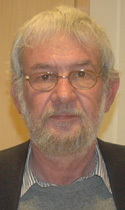 Nils Finn Munch-Petersen, Senior Expert at the Nordic Institute of Asian Studies (NIAS) in Copenhagen, lectures at Stockholm University on ”The Maldives: Democratization and Climate Threat”, on Wednesday 8 September 2010, 15–17. The seminar is organised by the Department of Oriental Languages, and is the first in a row of Wednesday lectures focusing on ”Current issues in Asia”, that are being held during the fall 2010. Munch-Petersen will give a background to developments since the 2008 presidential election, and present the current situation in the Maldives. He will also discuss the climate threat that the Maldivian government claims could make the islands disappear. Venue: Room 22, Department of Mathematics (besides Oriental Languages, ”KEMI” is written on the front door), Kräftriket 4B, Stockholm University.
Nils Finn Munch-Petersen, Senior Expert at the Nordic Institute of Asian Studies (NIAS) in Copenhagen, lectures at Stockholm University on ”The Maldives: Democratization and Climate Threat”, on Wednesday 8 September 2010, 15–17. The seminar is organised by the Department of Oriental Languages, and is the first in a row of Wednesday lectures focusing on ”Current issues in Asia”, that are being held during the fall 2010. Munch-Petersen will give a background to developments since the 2008 presidential election, and present the current situation in the Maldives. He will also discuss the climate threat that the Maldivian government claims could make the islands disappear. Venue: Room 22, Department of Mathematics (besides Oriental Languages, ”KEMI” is written on the front door), Kräftriket 4B, Stockholm University.
• SIPRI lecture on regional security order in Brazil, India and Russia
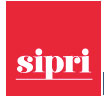 Stockholm International Peace Research Institute organises a
SIPRI Lecture on ”Regional powers: explaining regional security order in Brazil, India and Russia” in Stockholm on Thursday 9 September 2010,
14.00-15.30.
Dr Robert Stewart-Ingersoll from the Department of International Studies at the American University of Sharjah and Dr Derrick Frazier from the US Air Command and Staff College will present their ‘regional powers and security framework’, which helps to systematically identify regional powers and to understand their influence on the security order within their region. Special attention will be paid to the relationships between Brazil, India and Russia and their respective regional security complexes. Contact SIPRI Communications Director Stephanie Blenckner for registration.
Stockholm International Peace Research Institute organises a
SIPRI Lecture on ”Regional powers: explaining regional security order in Brazil, India and Russia” in Stockholm on Thursday 9 September 2010,
14.00-15.30.
Dr Robert Stewart-Ingersoll from the Department of International Studies at the American University of Sharjah and Dr Derrick Frazier from the US Air Command and Staff College will present their ‘regional powers and security framework’, which helps to systematically identify regional powers and to understand their influence on the security order within their region. Special attention will be paid to the relationships between Brazil, India and Russia and their respective regional security complexes. Contact SIPRI Communications Director Stephanie Blenckner for registration.
More information in SIPRI’s newsletter.
• Oslo seminar series on Gender and Performance in South Asia
 A two-weeks course on ”Gender and Performance in South Asia” will be held at the University of Oslo during the period 9–16 September 2010. It will be led by Prof. Kathryn Hansen (photo), University of Texas at Austin, USA. The course includes six lectures and the screening of a film entitled ”Music for a Goddess” (by Amy Catlin-Jairazbhoy and Nazir Ali Jairazbhoy, more information).
A two-weeks course on ”Gender and Performance in South Asia” will be held at the University of Oslo during the period 9–16 September 2010. It will be led by Prof. Kathryn Hansen (photo), University of Texas at Austin, USA. The course includes six lectures and the screening of a film entitled ”Music for a Goddess” (by Amy Catlin-Jairazbhoy and Nazir Ali Jairazbhoy, more information).
The focus for the course, organised by Department of Culture Studies and Oriental Languages (IKOS), University of Oslo, is the transformation of gender roles under colonialism and nationalism. This had a major impact on artistic expression and performance culture in South Asia. Who performed, for whom, for what purpose, in what genre and style – all of these shifted. The lectures are as follows:
– Tuesday 7 September, 16.15–18.00. ”Eroticism and Artistic Patronage in Pre-Colonial India”.
Venue: Seminar room 2, P A Munchs hus, Blindern, Oslo.
– Wednesday 8 September, 16.15–18.00. ”Sanitization of Performance under Colonialism and Nationalism”.
Venue: Seminar room 3, P A Munchs hus, Blindern, Oslo.
– Thursday 9 September, 16.15–18.00. ”Devadasis and Dance Traditions in South India”.
Venue: Seminar room 3, P A Munchs hus, Blindern, Oslo.
– Tuesday 14 September, 16.15–18.00. ”Baijis and Classical Music in North India”.
Venue: Seminar room 2, P A Munchs hus, Blindern, Oslo.
– Wednesday 15 September, 16.15–18.00. ”Female Impersonation and Parsi Theatre in Western India”.
Venue: Seminar room 3, P A Munchs hus, Blindern, Oslo.
– Thursday 16 September, 16.15–18.00. ”Ritual and Transgenderism Today”.
Venue: Seminar room 3, P A Munchs hus, Blindern, Oslo.
More information about the September 2010 Oslo course.
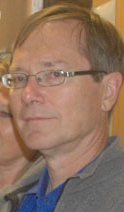 |
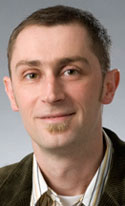 |
| Stig Toft Madsen and Uwe Skoda. | |
• Oslo seminar on Inheritance and power in India
In connection to the release of two new India related books by Scandinavian scholars, the University of Oslo organises a double seminar entitled ”Inheritance and power in India” on Monday 13 September 2010, 14.15–18.00. The invited speakers are Dr. Stig Toft Madsen, Nordic Institute of Asian Studies (NIAS), Copenhagen, who will talk about “Ajit Singh s/o Charan Singh”; and Dr. Uwe Skoda, Contemporary India Study Centre Aarhus (CISCA), Aarhus University, who will talk about ”Royal Hypogamy: Changing Marriage Patterns among Raj-families in central-eastern India”. More information about the seminar.
The practice of passing on power and influence from one generation to the next through dynastic succession continues to co-exist with universal franchise and the continued spread of democratic values in India. The lectures examine two distinct practices through which (political) dynasties are founded and reproduced: marriage and inheritance. Venue: Room 3, Georg Sverdrups hus, Blindern, Oslo.
After the two lectures, the new books will be presented:
– ”Demokrati på indisk” (Democracy in India), edited by Arild Engelsen Ruud and Geir Heierstad, with contributions also by Lars Tore Flåten, Kenneth Bo Nielsen, Pamela Price, Maren Aase, Guro Aandahl, Annika Wetlesen, Kathinka Frøystad and Sten Widmalm (Unipub publications, Oslo, 2010). More information about the book.
– ”Power and influence in India. Bosses, Lords and Captains”, edited by Pamela Price and Arild Engelsen Ruud (Routledge series on Explorations of the Political in South Asia, Delhi, 2010). More information about the book.
• Uppsala lecture on Significance of the Philosophy and Religion of Tantra
Professor Emeritus Kamalakar Mishra, former Head of the Dept. of Philosophy and Religion at Banaras Hindu University (BHU) in Varanasi, India, holds a guest lecture at Uppsala University on Monday 13 September 2010, at 17.00. He will talk about ”Significance of the Philosophy and Religion of Tantra as reflected in Kashmir Shaivism”. The seminar is organised by the Department of Linguistics and Philology, Uppsala University. Venue: Room 9-3042, Dept. of Linguistics and Philology, Engelska Parken, Uppsala. More information.
• Lund seminar with Indian Dalit women grassroots
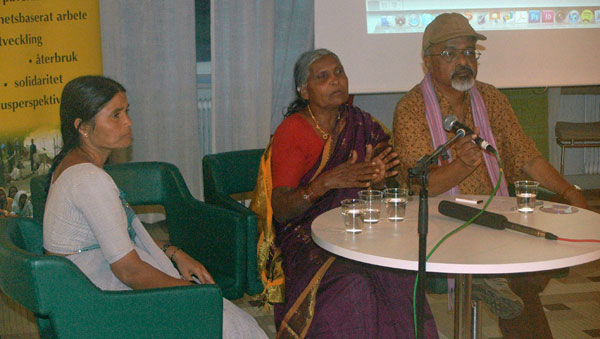 P V Satheesh, Masanagari Narsamma, Moligeri Chandramma and Vatturi Srinivas, representatives of the Deccan Development Society (a Dalit women’s grassroots association active in Medak District, Andhra Pradesh state, India) participate in a seminar in Lund on Wednesday 15 September 2010, 19.00–21.00. The seminar, entitled ”From food recievers to food providers – Journey of women and dalits in Medak, India” is jointly organized by the Association of Foreign Affairs at Lund University (UPF), and the The Swallows India-Bangladesh. Venue: Café Athen, Akademiska Föreningen, Sandgatan 2, Lund.
P V Satheesh, Masanagari Narsamma, Moligeri Chandramma and Vatturi Srinivas, representatives of the Deccan Development Society (a Dalit women’s grassroots association active in Medak District, Andhra Pradesh state, India) participate in a seminar in Lund on Wednesday 15 September 2010, 19.00–21.00. The seminar, entitled ”From food recievers to food providers – Journey of women and dalits in Medak, India” is jointly organized by the Association of Foreign Affairs at Lund University (UPF), and the The Swallows India-Bangladesh. Venue: Café Athen, Akademiska Föreningen, Sandgatan 2, Lund.
Deccan Development Society (DDS) is a two and half decade’s old grassroots organization primarily working with over 5 000 dalit women farmers from the semi arid belts of Medak District. At the heart of DDS activities is the fundamental principle of access and control which leads to the autonomy of local communities. This autonomy manifests in community food and seed sovereignty, autonomous healthcare systems, autonomous market and autonomous community media. DDS is the founder convenor of a number of networks which include AP Alliance for Food Sovereignty, AP Coalition in Defence of Diversity, South Against Genetic Engineering, Alliance Food Sovereignty South Asia, Alliance for Democratisation of Agricultural Research in South Asia.
More information about the DDS representatives coming to Lund. More information about the seminar.
• Kamalakar Mishra holds seminar series at Karlstad University
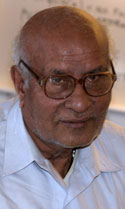 During three weeks in September 2010, Prof. Emeritus Kamalakar Mishra, former Head of the Dept. of Philosophy and Religion at Banaras Hindu University (BHU) in Varanasi, India, will give a series of open lectures on South Asian religion as a guest professor at Karlstad University. The seminars are jointly organised by the Department of Religious Studies and Theology, and the Faculty for Teacher’s Training at Karlstad University. Each lecture is an independent exposition on Indian religion and philosophy. Venue for allbut one of Prof. Mishra’s lectures: Hall B 512.
During three weeks in September 2010, Prof. Emeritus Kamalakar Mishra, former Head of the Dept. of Philosophy and Religion at Banaras Hindu University (BHU) in Varanasi, India, will give a series of open lectures on South Asian religion as a guest professor at Karlstad University. The seminars are jointly organised by the Department of Religious Studies and Theology, and the Faculty for Teacher’s Training at Karlstad University. Each lecture is an independent exposition on Indian religion and philosophy. Venue for allbut one of Prof. Mishra’s lectures: Hall B 512.
– Wednesday 15 September 2010 13.30-15.00: A General Introduction to Hinduism.
– Wednesday 22 September 2010 13.30-15.00: The Philosophical Foundations of Hinduism.
– Wednesday 29 September 2010 13.30-15.00: Sadhana and Forms of Worship in Hinduism.
– Thursday 30 September 2010 18.00-20.00: ”Man and Mother Nature: The Ecological Philosophy of Hinduism” (extra lecture, not to be found in original programme). Venue: Hall 5C 413.
More information.
• Oslo lecture on Srinathji ki Prakatya Varta
Emilia Bachrach, PhD student at the University of Austin in Texas, will hold a presentation at Oslo University on ”The Srinathji ki Prakatya Varta: Reading Mughal kingship and political change through a Vaishnava Hagiography” on Friday 17 September 2010, 10.15–11.15. Emilia examines the Shrinathji ki Prakatya Varta, a hagiography of the Vallabha Sampradaya, which narrates the movement of a local manifestation of Krishna, Shrinathji, from Braj to Nathdwara in the 17th century. Opposing common interpretations of the text, which claim that Shrinathji’s move was responding to Mughal aggression, Bachrach argues that the text is accounting for the political economic changes of the time. Instead of depicting Mughal leadership as evil, the varta portrays the Empire as one among many political entities competing for the prestige of caring for the sect and its powerful deity. Venue: P.A. Munch’s hus seminar room 9, University of Oslo at Blindern.
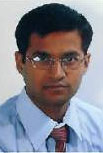 |
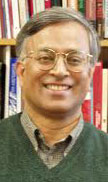 |
| Bharath Gopalaswamy and Subrata Ghoshroy | |
•
SIPRI workshop on Indian Missile Technology
 Stockholm International Peace Research Institute (SIPRI) organises a South Asia related half-day workshop on ”Missile defense – emerging technologies and regional concerns”, on Thursday 23 September 2010, 09.30 – 13.00. The workshop is held in cooperation with the Swedish Defense Research Agency and will bring together technical and policy experts to discuss missile defence and space security issues. The discussion will focus on the US administration’s recently re-designed missile defence initiative in Europe and on India’s emerging missile defence programme. The panelists will consider the implications of these activities for stability and security from regional perspectives. In addition, the workshop will examine how new missile defence technologies may affect space security in the future.
Stockholm International Peace Research Institute (SIPRI) organises a South Asia related half-day workshop on ”Missile defense – emerging technologies and regional concerns”, on Thursday 23 September 2010, 09.30 – 13.00. The workshop is held in cooperation with the Swedish Defense Research Agency and will bring together technical and policy experts to discuss missile defence and space security issues. The discussion will focus on the US administration’s recently re-designed missile defence initiative in Europe and on India’s emerging missile defence programme. The panelists will consider the implications of these activities for stability and security from regional perspectives. In addition, the workshop will examine how new missile defence technologies may affect space security in the future.
Dr Bharath Gopalaswamy, currently Researcher at SIPRI’s Non-Proliferation Programme, participates in a session on ”Missile Defense and Anti-Satellite Weapons”, whereas Mr Subrata Ghoshroy, project leader of the Nuclear Stability in South Asia Project at Massachusetts Institute of Technology (MIT), USA, will present a South Asian regional dimension to the issue. Other participants are Dr Lars Höstbeck, Deputy Head of Division, Swedish Defence Research Agency (FOI);
Dr Eva Bernhardsdotter, Researcher, Defence and Security Systems and Technology, FOI; and Dr Fredrik Lindvall, Researcher, FOI.
Please confirm your participation, giving your name and full affiliation, no later than Wednesday 22 September to Stephanie Blenckner, SIPRI Communications Director, phone: 08-655 97 47. Venue for the seminar: SIPRI, Signalistgatan 9, Solna.
• Oslo seminar on Hindi as a Contact Language of India
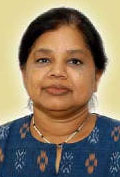 Prof. Anvita Abbi, chairperson at the Centre for Linguistics at the Jawaharlal Nehru University (JNU), Delhi, India, will lecture at Olso University on ”Hindi as a Contact Language of India” on Thursday 23 September, 14.15–16.00. Abbi, who was awarded the prestigious Rashtriya Lokbhasha Samman, is also connected to the Max Planck Institute of Evolutionary Anthropology in Leipzig, Germany . The lecture deals with the use of Hindi in India. Post independent India has witnessed an enormous increase in the users of Hindi as a contact language for inter-group and intra-group communication. Hindi in its non- standard varieties is used and accepted by scheduled and non-scheduled language speakers all over the country, but specifically in the northeast region (scheduled languages enjoy an official status whereas the others lack this status). Hindi in its non-standard form is seen as a big leveler since it mitigates the differences and hierarchies among disparate and distinct tribes. Prof. Abbi brings in examples from such varieties to demonstrate that Hindi is the only language available for communication for non-English speakers across the country. Venue: P.A. Munch’s hus seminar room 15, University of Oslo at Blindern.
Prof. Anvita Abbi, chairperson at the Centre for Linguistics at the Jawaharlal Nehru University (JNU), Delhi, India, will lecture at Olso University on ”Hindi as a Contact Language of India” on Thursday 23 September, 14.15–16.00. Abbi, who was awarded the prestigious Rashtriya Lokbhasha Samman, is also connected to the Max Planck Institute of Evolutionary Anthropology in Leipzig, Germany . The lecture deals with the use of Hindi in India. Post independent India has witnessed an enormous increase in the users of Hindi as a contact language for inter-group and intra-group communication. Hindi in its non- standard varieties is used and accepted by scheduled and non-scheduled language speakers all over the country, but specifically in the northeast region (scheduled languages enjoy an official status whereas the others lack this status). Hindi in its non-standard form is seen as a big leveler since it mitigates the differences and hierarchies among disparate and distinct tribes. Prof. Abbi brings in examples from such varieties to demonstrate that Hindi is the only language available for communication for non-English speakers across the country. Venue: P.A. Munch’s hus seminar room 15, University of Oslo at Blindern.
• Biomedical science in Bangladesh in focus for Stockholm seminar
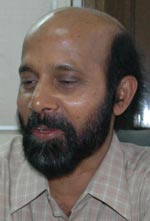 The Secretariat for Research Co-operation at the Swedish International Development Cooperation Agency (Sida), and the International Science Program (ISP) at Uppsala University, invite to a seminar on development support to science, to be held in Stockholm on Thursday 23 September 2010, 15.00–18.00. The seminar is entitled ”Catalytic effects of support to research group development – examples from biomedical science in Bangladesh and Zimbabwe”.
The Secretariat for Research Co-operation at the Swedish International Development Cooperation Agency (Sida), and the International Science Program (ISP) at Uppsala University, invite to a seminar on development support to science, to be held in Stockholm on Thursday 23 September 2010, 15.00–18.00. The seminar is entitled ”Catalytic effects of support to research group development – examples from biomedical science in Bangladesh and Zimbabwe”.
Dr Liaquat Ali (photo) from Bangladesh Institute of Research and Rehabilitation in Diabetes, Endocrine and Metabolic Disorders (BIRDEM) in Dhaka, Bangladesh, will give a presentation entitled ”Biomedical research as a catalyst for large scale health care and human resource development: Experience from Bangladesh”.
The research pursued by the group of Dr Ali has been directly supported by ISP from 1995 to 2008. SASNET’s Lars Eklund visited BIRDEM and Dr. Ali’s research group in 2005, read his report.
Venue for the seminar: Sida, room Asante, Valhallavägen 199, Stockholm. More information.
• Lund seminar on Opening up the Water Povery Index
Anna Jonsson, Assistant Professor and lecturer at the Environment Science Programme at Linköping University, lectures on ”Opening up the Water Poverty Index” – Exploring water management capacity at the village level” at Lund University on Friday 24 September 2010, 09.15 – 12.00. The seminar is part of a seminar series organised by Lund University Centre of Excellence for Integration of Social and Natural Dimensions of Sustainability (LUCID), that runs a PhD Course on Water Governance. Other guest lecturers include Dr. Peter P. Mollinga is a Senior Researcher at the Centre for Development Studies (ZEF) in Bonn, Germany, who is also Convener of SaciWATERs, Hyderabad, India. Full information about the seminar series.
Dr. Anna Jonsson has been involved in a major research project called ”Strategic Water Research Program – VASTRA. Selecting policy instruments, institutions, and conflict resolution mechanisms for sustainable catchment management.” She has her PhD in Water and Environmental Studies, Linköping University on Food and Fashion - Water Management and Collective Action among Irrigation Farmers and Textile Industrialists in South Inda. Her research interests include how institutional landscapes affect climate change adaptation and environmental management. Venue: Biosfären, 2nd floor Geocentrum, Lund.
• Copenhagen lecture on Goan Discourses of Colonialism and Tourism
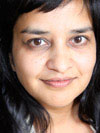 Dr. Pamila Gupta, researcher at Wits Institute for Social and Economic Research (WISER), University of the Witwatersrand in Johannesburg, South Africa, lectures at Copenhagen University on ”Goa –
An Internal Exotic in South Asia.
Discourses of Colonialism and Tourism”, on Tuesday 5 October 2010, 13.00–15.00. The lecture is organised by the Centre of Global South Asian Studies (CGSAS) and the Asian Dynamics Initiative (ADI), University of Copenhagen.
Pamila Gupta holds a PhD in Socio-cultural Anthropology from Columbia University, New York. Some of her recent publications include: “Introduction: Islandness in the Indian Ocean” in P. Gupta, I. Hofmeyr and M. Pearson, eds. Eyes Across the Water: Navigating the Indian Ocean. Venue: Leifsgade 33, 3rd Floor, Copenhagen.
Dr. Pamila Gupta, researcher at Wits Institute for Social and Economic Research (WISER), University of the Witwatersrand in Johannesburg, South Africa, lectures at Copenhagen University on ”Goa –
An Internal Exotic in South Asia.
Discourses of Colonialism and Tourism”, on Tuesday 5 October 2010, 13.00–15.00. The lecture is organised by the Centre of Global South Asian Studies (CGSAS) and the Asian Dynamics Initiative (ADI), University of Copenhagen.
Pamila Gupta holds a PhD in Socio-cultural Anthropology from Columbia University, New York. Some of her recent publications include: “Introduction: Islandness in the Indian Ocean” in P. Gupta, I. Hofmeyr and M. Pearson, eds. Eyes Across the Water: Navigating the Indian Ocean. Venue: Leifsgade 33, 3rd Floor, Copenhagen.
More information.
• Rural Economies and Structural Transformations in focus at Lund University’s development day
 Lund University’s Development Research Day 2010 will take place on Thursday 14 October 2010. The theme for the day will be ”Rural Economies and Structural Transformations”, which reflects the research scope of this year’s sponsor, the Rural Development Group , a Lund University-based research group consisiting of members from the Depts. of Economic History, Social and Economic Geography, and Sociology, with collaborators also at Linköping University and nine African research institutes.
Lund University’s Development Research Day 2010 will take place on Thursday 14 October 2010. The theme for the day will be ”Rural Economies and Structural Transformations”, which reflects the research scope of this year’s sponsor, the Rural Development Group , a Lund University-based research group consisiting of members from the Depts. of Economic History, Social and Economic Geography, and Sociology, with collaborators also at Linköping University and nine African research institutes.
PhD candidates and Masters students at Lund University are encouraged to present their research and exchange ideas during the parallel sessions, that will be more generally devoted to all other topics relating to development. Oral and poster presenters should register their participation before 4 October. Venue: Geocentrum 1 at Sölvegatan 10, Lund. Full information on the Development Research Day web site.
•
Geshe Pema Dorjee lectures at Karlstad University
Geshe Pema Dorjee,
Director of the Bodong Research and Publication Centre, Dharamsala, India, will lecture at Karlstad University on Wednesday 20 October 2010, 13.30–15.00. He will talk about ”Mindfulness & Meditation in Tibetan Buddhism”. The seminar is jointly organised by the Department of Religious Studies and Theology, and the Faculty for Teacher’s Training at Karlstad University. Venue: Hall 1B 309. More information.
• Information about South Asia related lectures and seminars
See SASNET's page, http://www.sasnet.lu.se/conferences.html
Business and Politics
• Information about South Asia related business and politics in Sweden
See SASNET's page, http://www.sasnet.lu.se/polbuss.html
South Asia related culture in Scandinavia
• Srilankan mask dance ensemble tours Norway
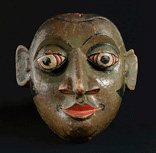 A Srilankan mask dance ensemble, Mono Natime, led by the recognized artist H.N.Thilakarathna,
visits Norway and gives several Tovil performances and workshops in Oslo during the period 22–26 September 2010. Tovils are colourful and spectacular dance offering rituals
performed in order to restore cosmic balance in cases, among Sri
Lankan Buddhists, where persons and communities are experiencing
illness and misfortune due to spiritual interventions. The mask
dance acts impersonates the characteristic traits of people
suffering from psychosomatic illnesses, birds, animals as well as
social types. It is suitable for all audience, including children.
The events are organised by Rikskonsertene and sponsored by the Norwegian Ministry of Foreign Affairs, Oslo Music and Cultural School, Nordic Black Theatre, and the Museum of Cultural History/University of Oslo. More information.
A Srilankan mask dance ensemble, Mono Natime, led by the recognized artist H.N.Thilakarathna,
visits Norway and gives several Tovil performances and workshops in Oslo during the period 22–26 September 2010. Tovils are colourful and spectacular dance offering rituals
performed in order to restore cosmic balance in cases, among Sri
Lankan Buddhists, where persons and communities are experiencing
illness and misfortune due to spiritual interventions. The mask
dance acts impersonates the characteristic traits of people
suffering from psychosomatic illnesses, birds, animals as well as
social types. It is suitable for all audience, including children.
The events are organised by Rikskonsertene and sponsored by the Norwegian Ministry of Foreign Affairs, Oslo Music and Cultural School, Nordic Black Theatre, and the Museum of Cultural History/University of Oslo. More information.
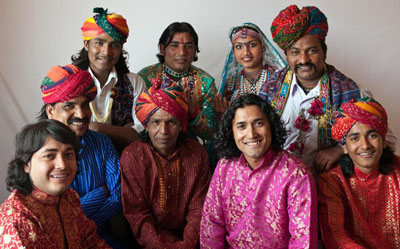 • Dhoad Gypsies perform at Malmö and Copenhagen
• Dhoad Gypsies perform at Malmö and Copenhagen
The Dhoad Gypsies from Rajasthan, a group well known all over the world as cultural ambassadors of the Rajasthani folk culture heritage, tours Europe during the period August-December 2010. On Sunday 10 October, at 19.00, they perform at Malmö, Sweden. Venue: Mix Musik, Kulturhuset Bong, Nordenskiöldsgatan 19. More information.
The day before, on Saturday 9 October, at they perform in Copenhagen, Denmark, at Global World Music Venue, Nørre Allé 7. More information.
• More information about South Asia related culture
in Sweden and Scandinavia
See SASNET’s page, http://www.sasnet.lu.se/culture.html
New and updated items on SASNET web site
• Swedish departments where research on
South Asia is going on:
Constantly added to the list of research environments at Swedish
universities, presented by SASNET. The full list now includes 271 departments,
with detailed descriptions of the South Asia related research and education
taking place! Go to http://www.sasnet.lu.se/environment.html
• Useful travelling information
Look at http://www.sasnet.lu.se/travelling.html.
Updated travel advises from the The British Foreign & Commonwealth
Office about safety aspects on travelling to the countries of
South Asia. Recent changed information on Afghanistan, Bangladesh and Pakistan.
Best regards,
Lars Eklund
deputy director/webmaster
SASNET/Swedish South Asian Studies Network
SASNET is a national network for research, education, and information about South Asia based at Lund University. Its aim is to promote a dynamic networking process in which Swedish researchers co-operate with researchers in South Asia and globally.
The SASNET network is open to all the sciences. Priority is given to interdisciplinary cooperation across faculties, and more particularly to institutions in the Nordic countries and South Asia. SASNET believes that South Asian studies will be most fruitfully pursued as a cooperative endeavour between researchers in different institutions who have a solid base in their mother disciplines.
The network is financed by Lund
University.
Postal address: SASNET – Swedish South Asian Studies Network,
Scheelevägen 15 D, SE-223 70 Lund, Sweden
Visiting address: Ideon Research Park, House Alpha 1 (first floor,
room no. 2040), in the premises of the Centre for East and South
East Asian Studies at Lund University (ACE).
Phone: + 46 46 222 73 40
Fax: + 46 46 222 30 41
E-mail: sasnet@sasnet.lu.se
Web site:
http://www.sasnet.lu.se
SASNET - Swedish South Asian Studies Network/Lund
University
Address: Scheelevägen 15 D, SE-223 70 Lund, Sweden
Phone: +46 46 222 73 40
Webmaster: Lars Eklund
Last updated
2010-11-05
